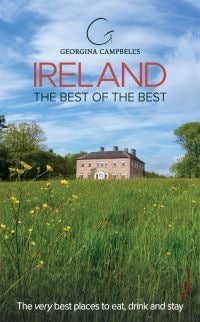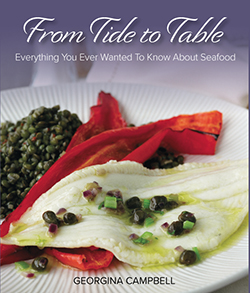- About ▼
- Awards
- Eat
- Drink
- Stay
- Buy
- Learn
- Producers
- 10 of the Best ▼
- Articles
- Blog
- Recipes ▼
- Special Offers
- Competitions
- Shop
- Recipe Cards
- Buy Guidebooks
- Buy Cookbooks
- GPS POIs for Garmin
- « Ireland Apps ▼
- « Cooking Apps
- iCook - Recipes & Cooking with Neven
- APPetiser - Recipes & Cooking with Derry Clarke
- For the Love of Food – Kevin Dundon
- More+ ▼
Our Future is Food
Ireland’s first PhD in Food Tourism, John Mulcahy, speaks with vision and experience when he says the Covid cloud has a silver lining – the food in tourism
 Whenever anything went wrong, a former colleague of mine always took the opportunity to remind us that you should never let a serious crisis go to waste. What they meant by that was every crisis, irrespective of scale, provides new perspectives. There is an opportunity to do things differently, things that you used to think that could not be done before the crisis.
Whenever anything went wrong, a former colleague of mine always took the opportunity to remind us that you should never let a serious crisis go to waste. What they meant by that was every crisis, irrespective of scale, provides new perspectives. There is an opportunity to do things differently, things that you used to think that could not be done before the crisis.
Rediscovering simple food pleasures
The pandemic is one of those opportunities, despite the personal grief, the economic hardship, the restrictions and the uncertainties that it has inflicted upon us. It is providing us all with an opportunity, whether we recognise it or not, to rediscover ourselves, our community, and our locality. We have rediscovered some of the simple food pleasures, like baking and family meals, and also the effort, skills, time and money needed to get catering at home right.
I believe we all now have a renewed appreciation of our country and what it has to offer, of the beverages and foods available, and what it takes to provide hospitality. While we haven’t quite become foodies, I think we are at a tipping point - we have realised that our ingredients, producers and artisans are world class. Thanks to the pandemic, there is a sense that there is increased respect and understanding of where our ingredients come from, who has grown them, and what to do with them. We have been led by clever and risk-taking chefs finding new ways to do business, particularly in home deliveries, while others share their knowledge like Mark Moriarity on RTÉ One’s 'Cook-In'.
 But this is not entirely new. We have been here before, although the financial crisis in 2007 now seems minor by comparison. Faced with challenging business conditions, the wider hospitality industries went back to basics, creating an Irish food renaissance which the Irish public responded to with gusto, as evidenced by the listings in the GC Guide. The zeitgeist for food that is local, sustainable, and linked to heritage has remained strong and continues to evolve. Food tourism became a ‘thing’.
But this is not entirely new. We have been here before, although the financial crisis in 2007 now seems minor by comparison. Faced with challenging business conditions, the wider hospitality industries went back to basics, creating an Irish food renaissance which the Irish public responded to with gusto, as evidenced by the listings in the GC Guide. The zeitgeist for food that is local, sustainable, and linked to heritage has remained strong and continues to evolve. Food tourism became a ‘thing’.
Why food is key
But this time there is a key difference. The domestic audience, Ireland’s population, seems to have little appetite for high risk travel abroad and the window of opportunity for staycations is closing fast as a new academic year approaches. The best option, then, is for us all to become domestic tourists exploring Ireland. A warning note for the industry, though – traditionally, domestic tourists have been mainly motivated by people oriented activities (family or social occasions, concerts, sport), and not just by destination. Covid has now generated a change of mindset, so that we are now consuming Ireland as a destination, and a leisure one at that, which is why food is key. Every hospitality and tourism business has to attract us, the Irish population, on that basis.
Overseas v domestic tourists – interesting facts
Similarly of course, the tourism and hospitality industries cannot rely on the traditional customers that they know best, tourists from overseas, as the people in those markets are making the same decisions about holidays as we are. This worries the thousands of small Irish businesses relying on overseas tourists, especially the seasonal operations, but here are some interesting facts. Fáilte Ireland estimates that the UK & USA alone usually make up more than 55% of visitors, but only 55% of those are holiday makers and the daily spend of an overseas tourist is €72. This turns out to be very close to the €71 generated by domestic overnight trips and, in each case, 40% of that is spent on food! Using 2018 figures, this means that food in domestic tourism alone is worth at least €1.5 billion annually. Even if this figure is reduced by 50% due to the pandemic, there is still a considerable amount of business to be gained through food alone over the next few months. And to be clear, the food in tourism is for everyone, not just foodies. We are all food tourists, every day, whether we realise it or not, whether we buy a ‘99’ at the seaside, have a picnic of fish and chips in the park, or travel to a specific place for the style of food they do.

Once-in-a-generation opportunity
So, courtesy of Covid, this is a once-in-a-generation opportunity for everyone involved in food and tourism. There is a captive local audience with time, money, and opportunity, hungry for a break from the house, and we have a range of hospitality, tourism, food, and beverage businesses desperately looking for customers to help them survive. This is an opportunity not just for tourism hot spots, or for the usual pubs, restaurants, B&B’s, hotels, and holiday rentals – it is for everyone in our food and tourism landscape, shaped by our farmers, growing our food.
This landscape is bigger than you might imagine, from farmers and fishermen, to artisan cheesemakers and food producers, to visitor centres and retail shops. I have always believed that tourism is the industry of every parish as those components are all there already – the accommodation, the places and food to eat, the producers and processors, the things to do, all driven by a community with their own best interest at heart, working together. In my experience, food and tourism incentives communities to identify their food story and to tell people what is on offer - never has that been more relevant than now. It doesn’t have to fancy or sophisticated. It just has to be true to the community.
Putting the economy back on its feet
Ireland has the best combination of ingredients, people, and places on the planet. No one loves our food more than we do. Our food story sets us apart – but right now, when we have the place to ourselves, we need everyone in Ireland to realise this, to celebrate our food as we explore our island, supporting the producers by looking for and consuming their products. And if we can harness that, we will help put an economy back on its feet, ensure the survival of thousands of livelihoods, and we will have a country of advocates proud to share the amazing story of Irish food with the world when the world opens up again.
#ThisisIrishFood
John first wrote about this for the Dublin Gastronomy Symposium in 2012 here
 John D. Mulcahy
John D. Mulcahy
Gastronomy tourism activist, advisor & researcher
Dublin
Recognised as the architect of food tourism development in Ireland. A lifetime of experience in the hospitality industries, in hospitality skills education, & as an Irish public servant in food tourism, enhanced by a PhD (Food Tourism), MA Degree (Gastronomy), MSc degree (Hospitality Mgt), & WSET Diploma in Wine & Spirits. Member of the Irish Food Champions Assembly (Twitter @irishfoodchamps), and Advisors & Experts Network, World Food Travel Association
Twitter: @JDeclanM
LinkedIn: www.linkedin.com/in/gastronomy






There are currently no comments
Leave a comment
Not a member? Register for your free membership now!
Or leave a comment by logging in with: